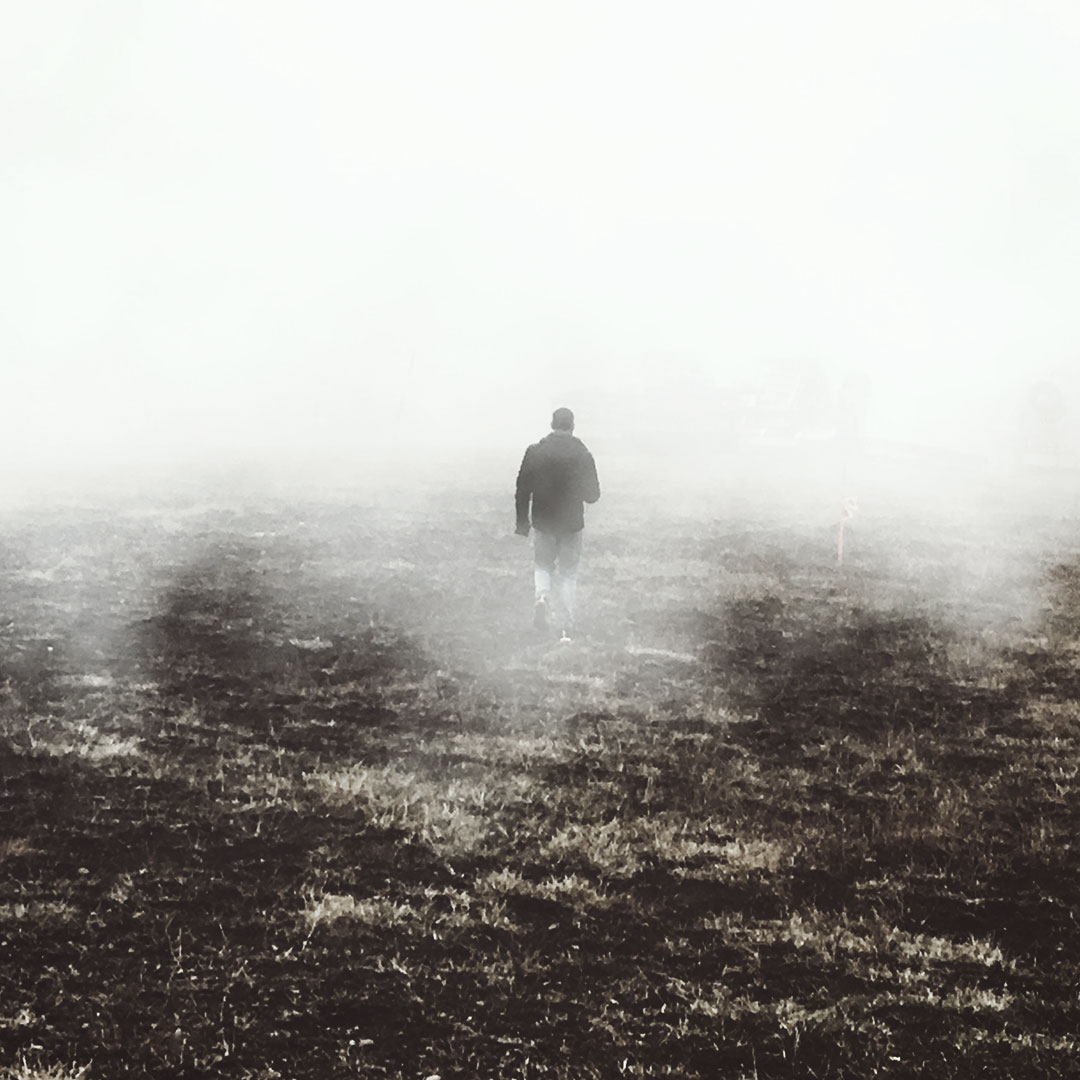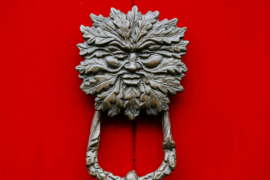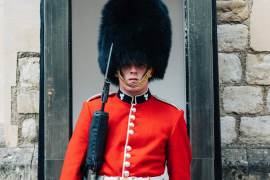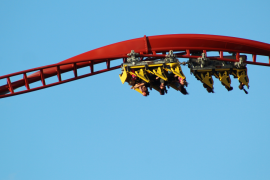The building, said our mother, was like a breast: round, squat, whirling turbine nipple. An obscene place for obscene behavior. But the sopaipillas were good, so on weekends we went to watch them play. The circular bar blocked view of the stage—the floor should spin, said Mother, like a Lazy Susan. Father said, Then everyone’d puke. From our booth across the room, Carmel and I glimpsed Father’s hand stretch to shake out cramps. Years later I’d think of that hand when, stopping by his house, we found him on the bedroom floor, body inside closet, feet sticking out. What, I asked, is he doing in the closet? Carmel called 911. His socks, black on bottom, we’d gifted for Christmas, so white he whistled when slipping them on.
***
Thing 1. Post-soundcheck piss. Black and yellow snake. Men’s room floor. Tonguing a puddle of piss—even piss must smell like rain to a desert snake. Son, you know what I’ll say next. Back in the bar, halfway ‘round the circle, an ex-girlfriend, the one before your mother. Laughing and spinning some barefoot boyfriend too drunk to two-step. Bix, onstage, charmed feedback from his Fender. I found boyfriend’s boots. Humid, smelly boots—good place for that snake. Later, while we played, I watched him tug them on. The song? “Loud and Lonely,” people shaking to the noise. Boyfriend’s face fidgeted but he, dumb-drunk, shrugged and lumbered out. I still see that snake: happy, warm—then crushed! Before long, word spread, she kicked boyfriend out—the sort, I hope she said, who dumps snakes from his boots. Rumors, too, he hit. I speak now for the snake: what a privilege, the part it played, helping rid that man.
***
Carmel he called “Buster.” Later, its feminine equivalent, “Busty.” I was “Gordo,” short for “Gordon.” You ought to have your head checked, Mother said, “Busty” for a girl her age! Yet “Gordo” she allowed. We were all handsomely sized. One day Carmel told him, Stop with “Gordo,” but I said I didn’t mind—a father’s nickname is a rare, fine thing.
The Circle Bar was on Tompa, corner of Navarro, between comic shop and carry-out liquor mart. Sticky-hot blacktop glinting with glass, dead roaches, cigarette cellophane. There’s magic to be found, Father said, in places like the Circle Bar.
Mother: We once had the chance to move to California, don’t ever forget that.
Friday and Saturday nights, overworked folks clutching quarts of Ibis beer, faces leathered by lifetimes of light. Carmel and I played in the lot while they soundchecked. Men emerged from the comic shop swinging microwave dinners in Albertson’s sacks. One, heavy with joy, always sniffed the air. Another, thrombosis-blackened ankles, had Send Help! tattooed around his ear. He showed me comics, superheroes and topless cartoon ladies. Carmel he chased like a goose, arms flapping, quacking and pinching her broad bottom. Father had the band hold him down, tossed his flip-flops on the roof. Fucker, Father said. His guitar sounded like a lawnmower revving up. Bix Barnwell spangled triplets with reverb. Iggy Magana bashed drums; Chuck G’s bass shook my insides. Bar at capacity, people danced in the lot, pitched empties into yards. After Father died they still showed up, three Fridays in a row, the band’s lone cassette on a boom-box, drinking in the lot until they seemed to discharge light.
***
Thing 2. I once, Gordo, puked up hope. Shimmery, silvery-gold hope. Hope for you and your sister. For the love of your mother. Unfortunately, we were onstage when it happened. Right onto the carpet. Dancers screamed and scattered. Pulpy, golden, seeming to steam. The boys had their eyes shut, playing. The song was “What’s Inside the Cave?” I watched it go from gold to gray. Dancers crept forward. Then it turned black as oil, melted across the floor. The smell. Iggy, eyes open, shouted: Is that shit? But I hadn’t puked up shit. I shouted over the noise: It’s hope, not shit! By now a bartender, giving this hope wide berth, came onstage, shouted in my ear: Hospital, now! Music stopped. Can you imagine, your mother coming around, spotting that mess? It’s cancer! someone shouted. Everyone ran, like cancer’s some poisonous snake. No, your mother said, it’s part of his stomach! They screamed. But it wasn’t my stomach. She got a cup, scraped up stuff with a knife to show the doctor. Someone fainted, another hurled. The bartender, horror-struck, said to bury the cup across the street. By the time we left it was pink and brown, regular old vomit, but everyone swore: gold, then black.
***
After Mother’s memorial years ago, he wriggled into the crawlspace underneath the house. I knelt: cigarettes butts, bottle caps, clumps. He didn’t come out. Filthy in there! I shouted. Then trembled: thirty-eight years old, both parents lost in only four days. The Tommys came outside. Iggy and Chuck G wrestled in the street. Bix smashed a bottle and screamed about fleas. They’d been drinking two days straight, keeping Father company.
At last he wriggled out, dragging denim sack. Bix asked, Cash? Acapulco Gold? Everyone laughed. Father whispered, Look, and unfurled the sack: dozens of women’s shoes, heels and flats, gleaming pumps. Whiffs of leather, sweat. Your mother’s, he announced. Swollen with sickness, she’d wanted them tossed. Father hid them first in the closet, then, when she found them—For some other woman, once I’m dead?—underneath the house.
He brought a single, peach-toned heel to his nose. Sighed. Take it, he said, for your apartment. I declined. Dumb boy, he said, putting it back. He whistled to the band: time for a drink at the Hiccuppin’ Snake.
Mother gone, he needed a job. His old gig, said Bix, had been good for his lyrics. Nightshift security, Kinetico Gasworks, little glass booth in the desert. He visited the manager, Old Bert. Don’t get guns no more, said Old Bert. Nine to five, PM to AM, Monday, Wednesday, Friday. What Old Bert didn’t say was the feedlot down the mountain had turned into a meatpacker’s. Feeding and milking now bolting, deboning. Those sounds, Father cried, all I hear is your mother, that horrible pain— Carmel said, Enough.
After his own funeral, on a lark, I drove up the mountain, watched the meatpacker’s glow. Suddenly a shriek—woman or saw? Then all at once: hissing, megaphoned burble, bellowing cattle, what sounded like gunshots. Green milky steam. Bone-melting screams. At home I told Carmel: I think he was right.
***
Thing 3. I once—a mistake—followed a woman backstage. Ernesto’s secret bar, red carpet, fake plants. She’d eyed me all set, brought tequila between songs, beautiful golden bells smelling of hibiscus. Bix leaned in, said, Good thing your old lady’s home tonight. Audience laughed. Never in a million, I said into the mic. But later, blazing with hibiscus, I followed a hall in pursuit of good perfume. Forty-five, fifty, lovely cream-colored dress—this wasn’t some Circle Bar gal. She sat in that room, teasing her shoe. Knew you’d come, she said. On the bar—God’s truth—a tres leches cake and bottle of Red Flower. Cake first, she said, then tequila.
Son, remember that snake? I was the snake, coiled in hope, fearing the dark. You’ve never found love, won’t understand, but angels were spraying hot molten gold. She tapped a stool, cut cake, poured drink. Victoria, she said. Eugene, I replied. Cake? she asked, licking a finger. We laughed and ate, drank, bottle gone. I saw future and past. Then, Victoria sprang a favor, her intent all along: her son’s band, the Trick Bags, needed a gig. Tequila squeezed my brain. What’s this, I shouted, some goddamned trick? She flinched. I tossed the cake, said, You clean it up. After that, all’s lost. Woke in a booth, cool Circle Bar leather, Ernesto sweeping up. Not dead? he said. Then: My advice? Don’t push what you’ve got.
***
Gordon, he’d say, find someone, before you turn forty! Who’ll help you when I’m gone? Don’t say your sister!
He received a visitor, a man from the Bureau of Tourism and Historical Records. Mr. Chance Delroy. Tape recorder and notebook—an exhibit on local rock and roll. Father’s eyes went wide as pancakes. For hours they talked, Ibis beer in coffee cups. Delroy knew the Circle Bar, the Tommys, the Hiccuppin’ Snake. People, said Father, talk about Tucson, Phoenix, El Paso, but here’s just as good. Delroy clapped his hands: The point of my exhibit!
He drove us to the Circle Bar, bought round after round. I’m burning alive! I shouted. Lights dimmed. The band hobbled onstage. Bix had a bottle of cough syrup he swigged between songs. Delroy actually knelt, pen and pad in hand, as they blessed him with the loudest, longest rendition of “What’s Inside the Cave?” in years. Even Ernesto came over, flipped on a spotlight that burned a hole through Father’s chest. Churning at chords, Father looked up, face gone. Everything shook. I screamed, afraid he’d spray smoke. Then I was in a booth between Carmel and Delroy, across from two youngsters with already-leathered faces. Busty, I was saying, did you see? That look he used to get? Delroy jabbered with glee. Busty, I said, Busty, did you see— Carmel smacked the table. That’s not my name, Gordon.
For the bureau exhibit Delroy hung photos, band young as kittens, teeth still white. In one sat Mother, mouth open, hand up. The Tommys played just one more show. Then, days later, we found him in his closet. Carmel held out that little orange bottle. I don’t understand, I said. She gave it a shake. Yes, you do, Gordon. Think for a minute.
***
Thing 4. Night shift over, coming down the mountain—there was our town, smothered in fog. Fog, in the desert! Our house clouded out. You, your mother, your sister still asleep. What, I wondered, if I didn’t come home, bypassed downtown, onwards to Blint? I started to sweat. Felt my foot shake. So I derived a solution, stopped at the Circle Bar. Ernesto fried eggs for the early morning drinkers. Those lonely old vampires each bought me beer. Good show, Eugene. Which one? I replied. Then I laid in a booth and dreamt: your mother, happiest I’ve seen, in her garden whispering to basil, to tomatoes big as balloons. Blue bandana, hair still thick. She picked a tomato. Said, Come smell the stem. Asked, Kids still asleep? She once taught me how they grow, the varietals, her homemade fertilizer. Eggshells, coffee grounds, epsom salts. She said, Thank God you’re home. I took her tomato, heavy as stone. Smelled its warm flesh.
JEFF FRAWLEY’S writing has appeared in or is forthcoming from Pif, Storm Cellar, Packingtown Review, Segue, Ellipses and Puerto del Sol. After receiving an M.F.A. from New Mexico State University, he served as a Fulbright scholar in Budapest, Hungary, performing research for a novel. “Regrettable Things My Father…” is taken from a novel-in-stories titled A Visitor’s Guide to Casagrande at Night. He now lives in southern New Mexico.
Like what you’re reading?
Get new stories sent to your inbox every Monday. Drop your email below to start >>>
OR Grab a Print Issue
Stories, poems and essays in a beautifully designed magazine you can hold in your hands.
GO TO ISSUES



